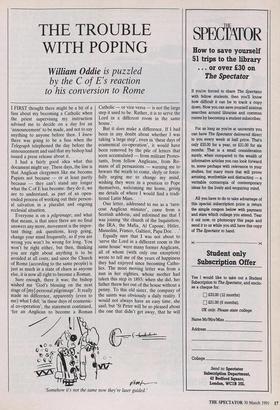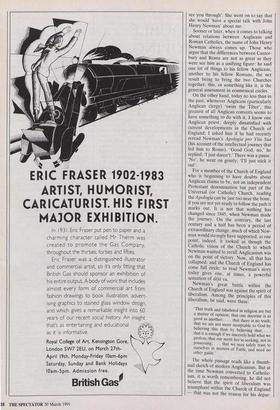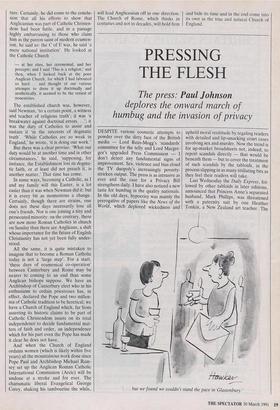THE TROUBLE WITH POPING
William Oddie is puzzled
by the C of E's reaction to his conversion to Rome
I FIRST thought there might be a bit of a fuss about my becoming a Catholic when the priest supervising my instruction advised me to decide on a day for an `announcement' to be made, and not to say anything to anyone before then. I knew there was going to be a fuss when the Telegraph telephoned the day before the announcement and said that my bishop had issued a press release about it. I had a fairly good idea what this document might say. These days, the line is that Anglican clergymen like me become Papists not because — or at least partly because — they can't stand any longer what the C of E has become: they do it, we are to understand, as part of an open- ended process of working out their person- al salvation in a pluralist and ongoing ecclesial situation.
Everyone is on a pilgrimage; and what that means, is that since there are no final answers any more, movement is the impor- tant thing: ask questions, keep going, change your mind frequently, so if you are wrong you won't be wrong for long. You won't be right either, but then, thinking you are right about anything is to be avoided at all costs; and since the Church of Rome (according to the same people) is just as much in a state of chaos as anyone else, it is now all right to become a Roman.
Sure enough, there it was; the bishop wished me 'God's blessing on the next stage of [my] personal pilgrimage'. It really made no difference, apparently (even to me) what I did; 'in these days of ecumenic- al co-operation', the statement continued, 'for an Anglican to become a Roman Catholic — or vice versa — is not the large step it used to be. Rather, it is to serve the Lord in a different room in the same house.'
But it does make a difference. If I had been in any doubt about whether I was taking 'a large step', even in 'these days of ecumenical co-operation', it would have been removed by the pile of letters that soon accumulated — from militant Protes- tants, from fellow Anglicans, from Ro- mans of all persuasions — warning me to beware the wrath to come, shyly or force- fully urging me to change my mind, wishing they were in a position to Pope themselves, welcoming me home, giving me details of where I would find a tradi- tional Latin Mass.
One letter, addressed to me as a 'turn- coat Anglican minister', came from a Scottish address, and informed me that I was joining 'the church of the Inquisition, the IRA, the Mafia, Al Capone, Hitler, Mussolini, Franco, Galtieri, Papa Doc...'
Equally sure that I was not about to `serve the Lord in a different room in the same house' were many former Anglicans, all of whom (with only one exception) wrote to tell me of the years of happiness they had enjoyed since becoming Catho- lics. The most moving letter was from a nun in her eighties, whose mother had taken this step in 1893: when she did, her father threw her out of the house without a penny. To this old sister, the company of the saints was obviously a daily reality. I would not always have an easy time, she said; but 'St Peter will be so pleased about the one that didn't get away, that he will 'Somehow it's not the same now they're laser guided.'
see you through'. She went on to say that she would 'have a special talk with John Henry Newman' about me.
Sooner or later, when it comes to talking about relations between Anglicans and Roman Catholics, the name of John Henry Newman always comes up. Those who argue that the differences between Canter- bury and Rome are not as great as they were see him as a unifying figure: he said one lot of things to his fellow Anglicans, another to his fellow Romans, the net result being to bring the two Churches together; this, or something like it, is the general assessment in ecumenical circles.
On the other hand, today no less than in the past, whenever Anglicans (particularly Anglican clergy) 'swim the Tiber', this greatest of all Anglican converts seems to have something to do with it. I know one Anglican priest, deeply dissatisfied with current developments in the Church of England; I asked him if he had recently reread Newman's Apologia pro Vita Sua (his account of the intellectual journey that led him to Rome). 'Good God, no,' he replied; 'I just daren't.' There was a pause. `No', he went on grimly; 'I'll just stick it out'.
For a member of the Church of England who is beginning to have doubts about Anglican claims to be, not an independent Protestant denomination but part of the Universal (or Catholic) Church, reading the Apologia can be just too near the bone, if you are not yet ready to follow the path it marks out. It is not that nothing has changed since 1845, when Newman made the journey. On the contrary, the last century and a half has been a period of extraordinary change, much of which New- man would strongly have supported; at one point, indeed, it looked as though the Catholic vision of the Church to which Newman wanted to recall Anglicanism was on the point of victory. Now, all that has collapsed, and the Church of England has come full circle: to read Newman's story today gives one, at times, a powerful sensation of déjà vu.
Newman's great battle within the Church of England was against the spirit of liberalism. Among the principles of this liberalism, he said, were these:
`That truth and falsehood in religion are but a matter of opinion; that one doctrine is as good as another; . . . that there is no truth; that we are not more acceptable to God by believing this than by believing that; . . that it is enough if we sincerely hold what we profess; that our merit lies in seeking, not in possessing; . . . that we may safely trust to ourselves in matters of Faith; and need no other guide.'
The whole passage reads like a thumb- nail sketch of modern Anglicanism. But at the time Newman converted to Catholic- ism, it is worth remembering, he did not believe that the spirit of liberalism was triumphant within the Church of England — that was not the reason for his depar-
ture. Certainly, he did come to the conclu- sion that all his efforts to show that Anglicanism was part of Catholic Christen- dom had been futile, and in a passage highly embarrassing to those who claim him as the patron saint of modern ecumen- ism, he said so: the C of E was, he said 'a mere national institution'. He looked at the Catholic Church
— at her rites, her ceremonial, and her precepts; and I said 'This is a religion;' and then, when I looked back at the poor Anglican Church, for which I had laboured so hard. . . and thought of our various attempts to dress it up doctrinally and aesthetically, it seemed to be the veriest of nonentities.
The established church was, however, said Newman, 'to a certain point, a witness and teacher of religious truth'; it was 'a breakwater against doctrinal errors. . .'; it was the duty of Catholics to assist and sustain it 'in the interests of dogmatic truth'. 'While Catholics are so weak in England,' he wrote, 'it is doing our work.' But there was a clear proviso- 'What our duty would be at another time and in other circumstances,' he said, 'supposing, for instance, the Establishment lost its dogma- tic faith, or at least did not preach it, is another matter.' That time has come.
In some ways, becoming a Catholic, as I and my family will this Easter, is a lot easier than it was when Newman did it: but it is every bit as momentous a change. Certainly, though there are strains, one does not these days necessarily lose all one's friends. Nor is one joining a tiny and persecuted minority: on the contrary, there are now more Roman Catholics in church on Sunday than there are Anglicans, a shift whose importance for the future of English Christianity has not yet been fully under- stood.
All the same, it is quite mistaken to imagine that to become a Roman Catholic today is not a 'large step'. For a start, `these days of ecumenical co-operation' between Canterbury and Rome may be nearer to coming to an end than some Anglican bishops suppose. We have an Archbishop of Canterbury elect who in his enthusiasm to ordain priestesses has, in effect, declared the Pope and two millen- nia of Catholic tradition to be heretical; we have a Church of England which, far from asserting its historic claims to be part of Catholic Christendom insists on its total independence to decide fundamental mat- ters of faith and order, an independence which for his part even the Pope has made it clear he does not have.
And when the Church of England ordains women (which is likely within five years) all the mountainous work done since Pope Paul and Archbishop Michael Ram- sey set up the Anglican Roman Catholic International Commission (Arcic) will be undone at a stroke and for ever. The charismatic liberal Evangelical George Carey, shaking his tambourine the while, will lead Anglicanism off in one direction. The Church of Rome, which thinks in centuries and not in decades, will hold firm and bide its time and in the end come into its own as the true and natural Church of England.




















































 Previous page
Previous page